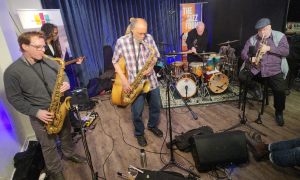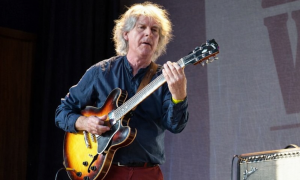Home » Jazz Articles » Live Review » John Geggie/Sunna Gunnlaugs/Justin Haynes Ottawa, Canada...
John Geggie/Sunna Gunnlaugs/Justin Haynes Ottawa, Canada May 22, 2004
Geggie
 With a season has seen everything from duets with pianist Marilyn Crispell to trios with saxophonist Mike Murley and drummer Jim Doxas, bassist John Geggie chose, on May 22, 2004, to close off this year’s “No Boundaries” series in a quiet and intimate chamber jazz setting, featuring Icelandic ex-pat, pianist Sunna Gunnlaugs, and Canadian guitarist Justin Haynes with a programme that was rich and moving without being any less demanding.
With a season has seen everything from duets with pianist Marilyn Crispell to trios with saxophonist Mike Murley and drummer Jim Doxas, bassist John Geggie chose, on May 22, 2004, to close off this year’s “No Boundaries” series in a quiet and intimate chamber jazz setting, featuring Icelandic ex-pat, pianist Sunna Gunnlaugs, and Canadian guitarist Justin Haynes with a programme that was rich and moving without being any less demanding. Opening with a solo rendition of Sam Jones’ “Bittersweet,” Geggie demonstrated, once again, why he is not just a local treasure but a national one as well; one to whom Ottawa jazz lovers should be grateful for choosing to remain in the city, as his talent and capacity for putting together appealing groups who have not previously worked together place him easily on the international stage. With a somewhat oblique melodic sensibility, he punctuated ambling lines with sharp chords and resonant whole tones.
The majority of the material for the evening came from Gunnlaugs, who has lived in New York for the past few years, and has released a number of fine records including ‘00’s Mindful and ‘03’s Live in Europe , from which some of the material was drawn. “Opposite Side” featured Gunnlaugs building her solo from tiny motifs, favouring the middle range of her instrument; Haynes’ solo was characterized by broad intervallic leaps that, no doubt, came from his studies with Ralph Towner; Geggie, also, built on similar wide jumps that were unfailingly accurate.
“Anima,” a waltz that featured a weaving melody of almost classical precision, also managed to mix in a certain folksiness. Gunnlaugs’ solo was beautifully built, peaking into Haynes, who exhibited a Frisell-like quirkiness blended with the more traditional side of Abercrombie, combining legato lines with a more direct approach. Geggie’s solo was uncharacteristically linear, although he still managed to find ways to punctuate his melodies with sharp chords.
“Holding Ground” was the closes thing to swing in the first set. Gunnlaugs’ material, characterized by defined structure, still left the trio plenty of room to move. While her material followed the tried-and-true tradition of theme-solos-theme, her themes were less than conventional, and always managed to sing.
Trying something a little different, the trio worked a Gregorian chant, called “Credo,” where a cantus firmus plainchant was used as the basis for improvisation. Beginning with bass and guitar, by the second time through the melody the piano had joined, enriching with chordal and contrapuntal accompaniment that was surprisingly intense over the simple ascending and descending guitar and bass line. While the concept was intriguing, things unfortunately never quite seemed to gel. Still, that’s what risk is all about, and credit is still due to the trio for taking the chance.
“Smack ‘Em,” another Gunnlaigs composition, finished up the first set with a convoluted melody reminiscent of Dave Holland’s Gateway composition, “Nexus.” Based around whole tones, the tune threatened to resolve into a more straightforward rhythm but never quite made it. Haynes delivered an exceptional solo that ranged from broad dissonant leaps to fleet-fingered post bop runs. The freest playing of the set, Haynes continued to draw Geggie and Gunnlaugs into equal levels of abstraction. Geggie’s solo managed to combine abstruse harmonics, intervallic leaps, dissonant chording and rapid-fire runs.
The second set opened with an improvisation between Geggie and Haynes, with Haynes creating swells with his volume pedal and odd themes that, much like Frisell, ended on emphatic low whole tones. Geggie brought out his bow to create strange glissandi while Haynes triggered loops that were, again, very reminiscent of Frisell but without a trace of Americana in sight.
Gunnlaugs returned to the stage for “Asleep in the Grass,” a thoroughly lyrical tune that highlighted Geggie’s penchant for implication; never quite settling into the more obvious groove, rather skirting around it. While Haynes and Geggie have played together in the past it was the first time grouped with Gunnlaugs, and some of the best moments of the evening were those where everyone was clearly in discovery mode; feeling each other out and finding common ground. One of the most admirable things about Geggie’s “No Boundaries” series has been the fearless first-time groupings where, with little preparation, the artists just throw things out to see what happens. While there is clearly an inherent risk Geggie has shown a remarkable ability to put just the right people together, as there are always moments of pure magic, and “Asleep in the Grass” contained many of them.
“Across the Sky,” a Geggie composition, received a rubato treatment that felt like the early days at ECM, perhaps recalling Gateway when Jack DeJohnette puts down the drumsticks and moves to the piano; think “Silver Hollow.” Haynes’ sustaining overdrive sound combined well with Gunnlaugs’ more impressionist treatment. Haynes, on this piece, sounded like a less cerebral Robert Fripp; not as academic and more overtly textural.
“Tatamagouche Tango,” an older piece by singer Tena Palmer, a past collaborator with Geggie in the group Chelsea Bridge, saw Haynes continuing to become more experimental as the evening progressed, creating loops over which he coaxed Derek Bailey-like sounds out of his instrument.
The trio closed with Gunnlaugs’ melancholy yet somehow hopeful “Mindful,” another piece that demonstrated her penchant for melodies with a folk-like simplicity; it also highlighted her disposition for pieces that shift in time signatures, this time with a five-bar theme followed by a four-bar bridge section. Closing on a deeply lyrical and richly emotional note, the trio created some of the most compelling music of the evening.
Gunnlaugs’ compositions showed that it was possible to combine intrigue with accessibility, freedom with structure; and Geggie’s choice to end this year’s series on a note that demonstrated the capability of jazz to challenge within a more approachable context was clearly a good one. Ottawa is fortunate, indeed, to have such a diverse and seasoned performer delivering an ongoing series of concerts that show local audiences they don’t have to look very far to find music of high calibre. With work already in progress for next year’s series, Geggie is sure to deliver more of the same.
Visit John Geggie on the web.
Tags
PREVIOUS / NEXT
Support All About Jazz
 All About Jazz has been a pillar of jazz since 1995, championing it as an art form and, more importantly, supporting the musicians who make it. Our enduring commitment has made "AAJ" one of the most culturally important websites of its kind, read by hundreds of thousands of fans, musicians and industry figures every month.
All About Jazz has been a pillar of jazz since 1995, championing it as an art form and, more importantly, supporting the musicians who make it. Our enduring commitment has made "AAJ" one of the most culturally important websites of its kind, read by hundreds of thousands of fans, musicians and industry figures every month.







![Full Moon [Feat. New York Voices, Mark Egan]](https://s3.amazonaws.com/allaboutjazz/coverart/large/a07a6f1d5edcd6c801f0e1c3b527da37.jpg)















